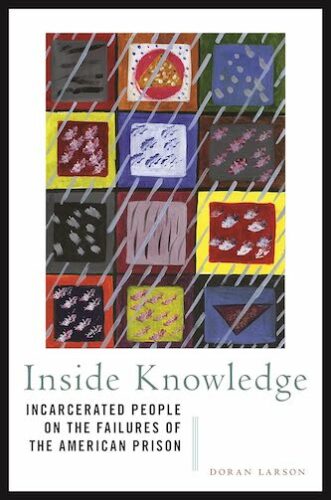By Bill Littlefield
Prison doesn’t “fail” so much as it succeeds at missions nobody in authority wants to acknowledge: punishment, humiliation, and separation from the community beyond the walls.
Inside Knowledge: Incarcerated People on the Failures of the American Prison by Doran Larson. New York University Press, 298 pages, $30.

Inside Knowledge presents a thoughtful, well-documented history of the origin, the rationales, and the practice of incarcerating people in this country, and a great many testimonies from the people who know best how thoroughly that practice has failed to achieve its alleged goal of “rehabilitating” the people prisons are supposed to serve. Those people have been locked up in cramped quarters all over the U.S., which is the world’s leader at imprisoning its citizens. Many of those citizens are people of color, people who are poor, and people who suffer from chronic conditions which should addressed in hospitals or clinics, rather than in prisons. The hypocrisy built into the system is fundamental to its operation. Prison doesn’t “fail” so much as it succeeds at missions nobody in authority wants to acknowledge: punishment, humiliation, and separation from the community beyond the walls.
Doran Larson, a professor at Hamilton College, led writing workshops at Attica Correctional Facility for ten years and has organized two college-in-prison programs. He co-directs the American Prison Writing Archive, which he celebrates as a vehicle for informing the public about what people incarcerated in this country suffer. Larson maintains convincingly that what these writers have to say must be taken into account by people endeavoring to alter the justice system’s current circumstances, under which incarcerated folks have little opportunity for “rehabilitation.” As he puts it, “The writers gathered here should sober our notions of what legal punishment means in practice.”
What the incarcerated writers have to say is chilling. The system they describe is shameful as well as obscenely absurd, and often it is deadly. As one prisoner in Tennessee writes, “I became like an animal being fed through a fence…Having to fight for my right to exist and never completely succeeding.”
Writer after writer describes the circumstances of what Larson calls “planned deprivation.” Waiting lists for the few programs available at some institutions are thousands of names long. One South Dakota writer reports that judges from all over the state “sentence women here to complete this program that no longer exists due to no staff.” Programs for people dealing with addiction are often unavailable or staffed by corrections officers who have no training as counselors. One writer incarcerated in Washington reports that, “the only programs I have found in prison that I think are worth anything at all came from the volunteers.”
Larson maintains that without opportunities to learn and grow, and without adequate care for physical and psychological conditions, incarcerated people too often leave prison in worse shape than they were in when they entered the institutions. Victims of daily brutality and racism in the institutions where they’ve been confined, sometimes for decades, incarcerated men and women often become chronically frightened, bitter, and apathetic. Some who had never committed violent acts learn violence as a survival mechanism. Many of the men and women represented in this book report that the effect of the “dehumanizing environment” is that that have come to feel less human and less capable of building a life when they leave prison. Despair is common, though Inside Knowledge does contain stories of how incarcerated men and women have found life-saving support among others who are incarcerated.
Though the stories Larson’s correspondents tell should make any reader ashamed that the conditions described in Inside Knowledge exist, the author does offer a prescription for change. As Larson writes in his conclusion, “The hope of this book is that a revolution, while required, might be led peacefully when we take to heart the lessons that prisons teach incarcerated people and that they can teach us about the manufactories of pain that have stood for over two centuries as this nation’s icons of justice.”
Bill Littlefield volunteers for the Emerson Prison Initiative. His most recent novelis Mercy (Black Rose Writing, 2022)
This post was originally published on this site be sure to check out more of their content.








